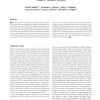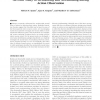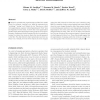8 search results - page 1 / 2 » fMRI Activation during Observation of Others' Reach Errors |
JOCN
2010
12 years 11 months ago
2010
When exposed to novel dynamical conditions (e.g., externally imposed forces), neurologically intact subjects easily adjust motor commands on the basis of their own reaching errors...
JOCN
2011
12 years 7 months ago
2011
■ Humans commonly understand the unobservable mental states of others by observing their actions. Embodied simulation theories suggest that this ability may be based in areas of...
JOCN
2010
12 years 11 months ago
2010
Human behavioral studies demonstrate that healthy aging is often accompanied by increases in memory distortions or errors. Here we used event-related fMRI to examine the neural ba...
JOCN
2010
2010
Medial Temporal Lobe Activity during Source Retrieval Reflects Information Type, not Memory Strength
13 years 3 months ago
■ The medial temporal lobes (MTLs) are critical for episodic memory but the functions of MTL subregions are controversial. According to memory strength theory, MTL subregions co...
JOCN
2011
12 years 7 months ago
2011
■ Observers spontaneously segment larger activities into smaller events. For example, “washing a car” might be segmented into “scrubbing,” “rinsing,” and “drying�...



